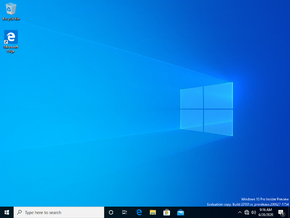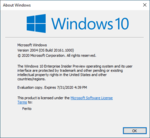Windows 10 build 20161
| Build of Iron | |
 | |
| OS family | Windows 10 (NT 10.0) |
|---|---|
| Version number | 10.0 |
| Build number | 20161 |
| Build revision | 1000 |
| Architecture | x86, x64, ARM64 |
| Build lab | rs_prerelease |
| Compiled on | 2020-06-27 |
| Expiration date | |
| Timebomb | 2020-07-31 (+34 days) |
| SKUs | |
| Home (N, Single Language, China) Pro (N, Single Language, China) Pro Education (N) Pro for Workstations (N) Education (N) Enterprise (G, N) Enterprise Evaluation (N) Enterprise multi-session IoT Enterprise Team | |
| Product key | |
| Use a Windows 10 Retail serial | |
| About dialog | |
Windows 10 build 20161 is the third Insider Preview build of Iron, the 21H1 development semester of Windows as a service. It was released to Windows Insiders in the Dev Channel on 1 July 2020.
New features and changes[edit | edit source]
[edit | edit source]
- Tiles for pinned apps no longer have an accent color. Instead, they are now theme-aware and can be white or black depending on the system theme. If transparency effects are enabled, they will also have an acrylic transparency.
- Apps on the apps pane no longer have their icons displayed under an accent-colored backplate.
- The icon for app folders has been updated to follow the Fluent Design system.
Focus assist changes[edit | edit source]
The summary and automated rule enablement notifications for Focus Assist are now disabled by default.
Settings changes[edit | edit source]
- Information and links from Control Panel's legacy system page have been fully migrated to Settings and links that previously opened the Control Panel page now open the Settings counterpart. In addition, Windows and device specifications are now copyable via buttons on each section.
- Security status data has been consolidated. While summary messages are still shown, the rest of the details have been removed, and they can be queried on the Windows Security page under the Update and Security section.
- The "Tablet mode" page under the System section has been renamed to simply "Tablet".
Tablet experience enhancements[edit | edit source]
- The notification toast that previously asked 2-in-1 users to switch to tablet mode when detaching the keyboard has been removed. It will instead switch to the new tablet experience from May 2020 Update build 19041.329.
- The quick action for Tablet mode is now automatically removed from the Action Center on non-touch devices to prevent confusions.
- A new logic is incorporated to let users boot into the appropriate mode according to the mode they were last in and whether the keyboard is attached or not.
Miscellaneous[edit | edit source]
- Open tabs in Microsoft Edge are now shown individually in Alt+Tab instead of just the windows. This feature requires versions 83 or higher of the browser.
- Programmable Taskbar has been added, which allows to provide a customized default taskbar layout in new user accounts, depending on the different scenarios present in their Microsoft account linking experiences.
- Both the Alarms & Clock and Paint 3D apps now require updates to be installed before starting up for the first time.
- Paint 3D's icon has been updated, resembling a multicolored teardrop shape.
Findings[edit | edit source]
Enabling the new features[edit | edit source]
On some machines, the features observed in this build are not available by default. To manually enable them, use a velocity staging tool to enable these IDs:
23615618 23282664 23447524 23454425 15003065
After typing the commands, restart the computer to see the new features enabled. However, they can sometimes revert randomly after several restarts, but they can also revert while the computer is in use.
Bugs and quirks[edit | edit source]
- There's a chance that the system may crash with a
HYPERVISOR_ERROR. - The update process to this build has a chance of hanging for extended periods of time.
- Notepad may fail to open files which were automatically saved during a PC upgrade (or restart if enabled in Settings). Saved documents can be recovered from
%localappdata%\Notepad. - Task Manager has a chance of showing a CPU speed of 0.00 GHz or abnormally high values on the Performance tab.
- In certain apps, if pressing Space while using the Korean IME, the last character is deleted.
- Some flashes of color during the tile animations may appear on the Start menu.
- The setting under Settings > System > Multitasking to set Alt+Tab to "Open windows only" does not work on this build.
Alternative toasts experience[edit | edit source]
If many of the new features, except the new toasts experience, were disabled by default on the PC, a rare condition would appear in which not all of the improvements made would be visible, since the new X for dismissing toasts to the Action Center is not present, and the arrow from the older design is used in place.












